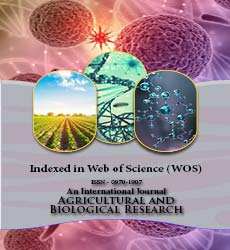Agricultural and Biological Research
RNI # 24/103/2012-R1
L. Archana Devi, S. Iruthaya Kalai Selvam* and T. Nirmala
The main problems that agricultural production faces are the shortage of irrigation water. The damage caused by water stress is one of the most critical environmental stresses that cause heavy loss to agriculture worldwide. Two field experiments were performed at a private agricultural farm in Nagalapuram, Theni district, Tamil Nadu, India in 2019 to study the response of physicochemical analysis of soil, vegetative growth and yield attributes of Okra plants (Abelmoschus esculentus L) and eggplants (Solanum melongena). The experiment was done with a Randomized complete block design with four replicates. These experiments included seven treatments which were the combination of 3 irrigation intervals and 5 foliar applications of anti transpirants such as Potassium silicate and Glycine betaine. Increasing the irrigation water to 100% improved plant growth, nutrient uptake, and biological yield. The yield of okra irrigated with 75% and 50% was lower by about 7.8% and 13.8% that received 100% water requirements. Likewise, the yield of eggplant with 75% and 50% of irrigation was lower by about 14.5% and 21.7% than that of 100% irrigation. Foliar application of potassium silicate and glycine betaine with 75% irrigation of okra and eggplant reached 97.5% and 96.95% respectively and 50% of irrigation reached around 89.5% and 86.6% of the yield of 100% irrigation. The results obtained from the present investigation show that spaying of potassium silicate and glycine betaine at 2.5 ml/L under water deficit areas increased the growth rate and yield of the okra and eggplant and also these treatments (T4-T7) lets plants resistance to drought stress.
